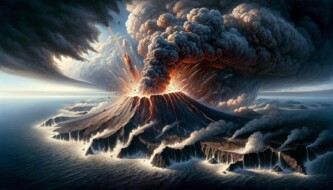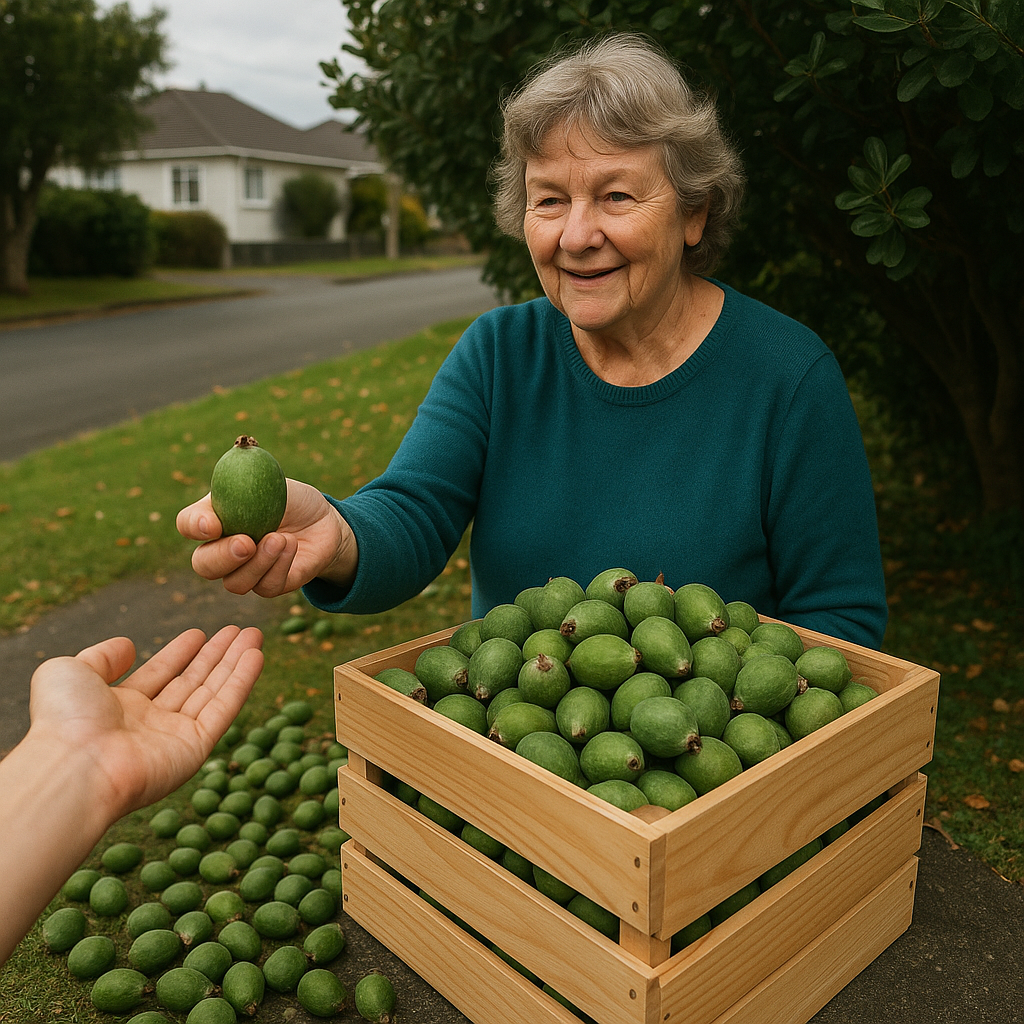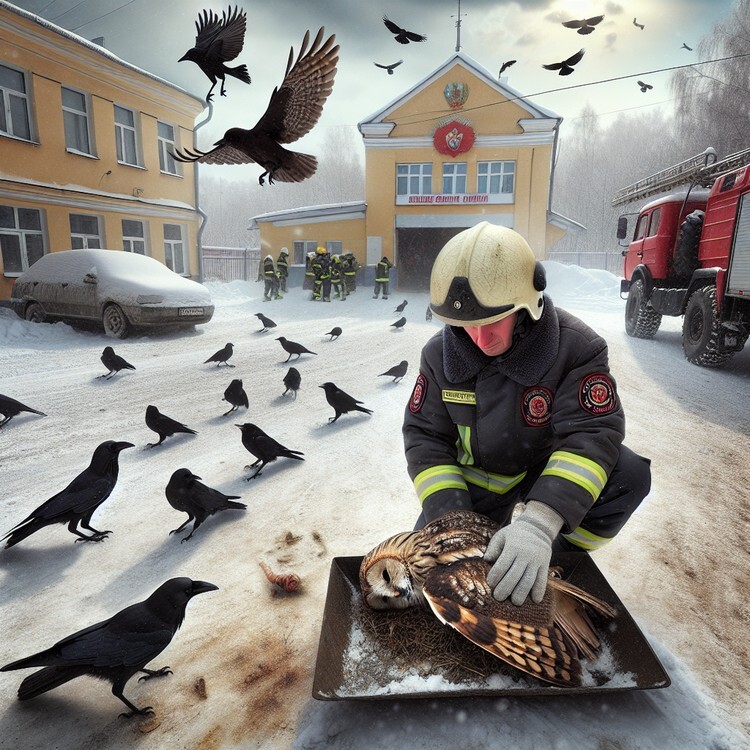A big mountain that spits fire, called a volcano, went boom on an island in Japan. The boom sent rocks high into the air and into the water. This island is very young, only 10 years old, and its name means “new island.” People who watch the ocean in Japan took a video of the big boom. The video shows a lot of smoke and rocks flying up and then falling down into the sea.
The island is part of a place where the earth shakes and has many fire mountains, called the “Ring of Fire.” This boom did not hurt people because no one lives close to the island. But it shows that people need to keep watching the fire mountains. Japan has many fire mountains that can go boom. Scientists like to learn about new islands like this one because they help us understand the earth better. Japan is always watching its fire mountains to keep people safe.
Original news source: Watch: Volcano in Japan spews ash, rock 200m into sky (BBC)
Listen
Slow
Normal
Fast
Group or Classroom Activities
Warm-up Activities:
– Charades
Instructions: Divide the class into two teams. Choose keywords from the article (e.g. volcano, island, boom, smoke, rocks) and write them on separate pieces of paper. One student from each team will come to the front of the class and act out the keyword without speaking. The team members must guess the keyword within a certain time limit (e.g. 1 minute). The team with the most correct guesses wins.
– News Summary
Instructions: In pairs, students will take turns summarizing the article to their partner. They should try to include the main points of the article in their summary. After each student has finished, they can compare their summaries and discuss any differences or similarities.
– Vocabulary Pictionary
Instructions: Divide the class into pairs. Give each pair a list of vocabulary words from the article (e.g. volcano, island, boom, smoke, rocks). One student will choose a word and draw a picture to represent it, while the other student tries to guess the word. They can switch roles after each word. The pair with the most correct guesses wins.
– Pros and Cons
Instructions: Divide the class into two groups. One group will brainstorm the pros of living near a volcano (e.g. beautiful scenery, natural hot springs), while the other group will brainstorm the cons (e.g. risk of eruptions, air pollution). Each group will then present their ideas to the class and have a discussion about which group’s arguments were most convincing.
– Think-Pair-Share
Instructions: Ask the students to think about the following question: “Why is it important for scientists to study and monitor volcanoes?” Give them a few minutes to think about their answer, then pair them up with a partner to discuss their ideas. After discussing, each pair will share their thoughts with the rest of the class. Encourage students to use new vocabulary from the article in their discussions.
Comprehension Questions:
1. What happened to the volcano on the island in Japan?
2. What did the boom send into the air and water?
3. How old is the island?
4. What does the name of the island mean?
5. Who took a video of the big boom?
6. What did the video show?
7. Why do scientists like to learn about new islands like this one?
Go to answers ⇩
Listen and Fill in the Gaps:
A big (1)______ that spits fire, called a volcano, went (2)______ on an island in Japan. The boom sent rocks high into the air and into the water. This island is very young, only 10 years old, and its name means “new island.” People who watch the ocean in Japan took a video of the big boom. The video shows a lot of smoke and (3)______ flying up and then falling down into the sea.
The island is part of a (4)______ where the earth shakes and has many fire mountains, called the “Ring of Fire.” This boom did not hurt people because no one lives close to the (5)______. But it shows that people need to keep (6)______ the fire mountains. Japan has many fire mountains that can go boom. (7)______ like to learn about new islands like this one because they help us (8)______ the earth better. Japan is always watching its fire mountains to keep people safe.
Go to answers ⇩
Discussion Questions:
Students can ask a partner these questions, or discuss them as a group.
1. What is a volcano?
2. How would you feel if you saw a big boom from a volcano?
3. Do you like watching videos of volcanoes? Why or why not?
4. What do you think happens when rocks fly up and then fall down into the sea?
5. Have you ever seen a fire mountain? What did it look like?
6. How do you think scientists learn about new islands like the one in Japan?
7. Do you think it’s important to watch fire mountains to keep people safe? Why or why not?
8. What do you think the “Ring of Fire” is?
9. Have you ever felt the earth shake? How did it feel?
10. Why do you think Japan has many fire mountains?
11. What can we learn about the earth by studying new islands?
12. How do you think people in Japan feel when they see a volcano go boom?
Individual Activities
Vocabulary Meanings:
Match each word to its meaning.
Words:
1. volcano
2. island
3. boom
4. rocks
5. water
6. video
7. smoke
8. sea
Meanings:
(a) Moving pictures that show what happened
(b) Hard things that come from the ground
(c) A liquid that covers most of the earth
(d) A piece of land surrounded by water
(e) The gray stuff that comes from fire
(f) A big mountain that spits fire
(g) The big body of water where the rocks fell
(h) A loud sound like an explosion
Go to answers ⇩
Multiple Choice Questions:
1. What happened on the island in Japan?
(a) A big mountain spits fire
(b) A big mountain disappeared
(c) A big mountain grew taller
(d) A big mountain turned into ice
2. How old is the island?
(a) 100 years old
(b) 1 year old
(c) 10 years old
(d) 1000 years old
3. What does the name of the island mean?
(a) Old island
(b) Big island
(c) New island
(d) Small island
4. What did people see in the video of the boom?
(a) Fish swimming in the water
(b) Smoke and rocks flying up
(c) Birds flying in the sky
(d) Trees growing on the island
5. Where is the island located?
(a) In Japan
(b) In China
(c) In Australia
(d) In America
6. What is the “Ring of Fire”?
(a) A place with many waterfalls
(b) A place with many trees
(c) A place with many animals
(d) A place with many fire mountains
7. Did the boom hurt people?
(a) Yes, many people were hurt
(b) No, because no one lives close to the island
(c) No, because the island is very old
(d) Yes, but only a few people were hurt
8. Why do scientists like to learn about new islands?
(a) Because it helps us understand the sky better
(b) Because it helps us understand the ocean better
(c) Because it helps us understand the animals better
(d) Because it helps us understand the earth better
Go to answers ⇩
True or False Questions:
1. The island where the explosion happened is only 10 years old and is called “new island.”
2. Scientists do not like to study new islands like this one to learn more about the earth.
3. The implosion sent rocks low into the air and into the water.
4. Luckily, everyone was hurt by the explosion because everyone lives close to the island.
5. The video shows a lot of smoke and rocks flying up and then falling into the sea.
6. People who were watching the ocean in Japan made a video of the explosion.
7. There was a big explosion on a mountain that spits fire on an island in Japan.
8. The island is not part of a place called the “Ring of Fire” where the earth shakes and there are many fire mountains.
Go to answers ⇩
Write a Summary:
Write a summary of this news article in two sentences.
Check your writing now with the best free AI for English writing!
Writing Questions:
Answer the following questions. Write as much as you can for each answer.
Check your answers with our free English writing assistant!
1. What happened to the volcano on the island in Japan?
2. How old is the island?
3. What does the word “volcano” mean?
4. What did the video show?
5. Why do scientists like to learn about new islands?
Answers
Comprehension Question Answers:
1. What happened to the volcano on the island in Japan?
The volcano on the island in Japan went boom.
2. What did the boom send into the air and water?
The boom sent rocks into the air and water.
3. How old is the island?
The island is 10 years old.
4. What does the name of the island mean?
The name of the island means “new island.”
5. Who took a video of the big boom?
People who watch the ocean in Japan took a video of the big boom.
6. What did the video show?
The video showed a lot of smoke and rocks flying up and then falling down into the sea.
7. Why do scientists like to learn about new islands like this one?
Scientists like to learn about new islands like this one because they help us understand the earth better.
Go back to questions ⇧
Listen and Fill in the Gaps Answers:
(1) mountain
(2) boom
(3) rocks
(4) place
(5) island
(6) watching
(7) Scientists
(8) understand
Go back to questions ⇧
Vocabulary Meanings Answers:
1. volcano
Answer: (f) A big mountain that spits fire
2. island
Answer: (d) A piece of land surrounded by water
3. boom
Answer: (h) A loud sound like an explosion
4. rocks
Answer: (b) Hard things that come from the ground
5. water
Answer: (c) A liquid that covers most of the earth
6. video
Answer: (a) Moving pictures that show what happened
7. smoke
Answer: (e) The gray stuff that comes from fire
8. sea
Answer: (g) The big body of water where the rocks fell
Go back to questions ⇧
Multiple Choice Answers:
1. What happened on the island in Japan?
Answer: (a) A big mountain spits fire
2. How old is the island?
Answer: (c) 10 years old
3. What does the name of the island mean?
Answer: (c) New island
4. What did people see in the video of the boom?
Answer: (b) Smoke and rocks flying up
5. Where is the island located?
Answer: (a) In Japan
6. What is the “Ring of Fire”?
Answer: (d) A place with many fire mountains
7. Did the boom hurt people?
Answer: (b) No, because no one lives close to the island
8. Why do scientists like to learn about new islands?
Answer: (d) Because it helps us understand the earth better
Go back to questions ⇧
True or False Answers:
1. The island where the explosion happened is only 10 years old and is called “new island.” (Answer: True)
2. Scientists do not like to study new islands like this one to learn more about the earth. (Answer: False)
3. The implosion sent rocks low into the air and into the water. (Answer: False)
4. Luckily, everyone was hurt by the explosion because everyone lives close to the island. (Answer: False)
5. The video shows a lot of smoke and rocks flying up and then falling into the sea. (Answer: True)
6. People who were watching the ocean in Japan made a video of the explosion. (Answer: True)
7. There was a big explosion on a mountain that spits fire on an island in Japan. (Answer: True)
8. The island is not part of a place called the “Ring of Fire” where the earth shakes and there are many fire mountains. (Answer: False)
Go back to questions ⇧















